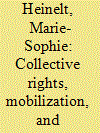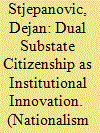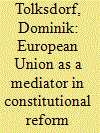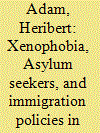|
|
|
Sort Order |
|
|
|
Items / Page
|
|
|
|
|
|
|
| Srl | Item |
| 1 |
ID:
142487


|
|
|
|
|
| Summary/Abstract |
This article outlines a comparative perspective on legal multiculturalism in Latin America. It analyzes how consultation and territorial autonomy rights may be used to include the interests of indigenous and afro-descendant minorities in decision making. It is argued that (a) the organizational forms of minorities and (b) previous patterns of interaction with state actors need to be taken into account systematically. Scrutiny of two case studies from Colombia and Panama shows that collective rights can improve access to decision makers and help to channel minority interests into policy outputs. Both case studies reveal that confederal organizational forms help to maintain coherent ethnic mobilization. The Panamanian case furthermore demonstrates that previous interactions with state actors can result in bargaining advantages for minorities.
|
|
|
|
|
|
|
|
|
|
|
|
|
|
|
|
| 2 |
ID:
142483


|
|
|
|
|
| Summary/Abstract |
This article analyzes the politics and constitutional position of the Brčko District of BiH, drawing on this case to inform several important debates in the field with regards to questions of federalism, citizenship, and electoral politics. The article shows that the condominium logic of territorial arrangement has profound implications for substate citizenship in Brčko. It argues that apart from territorial options and consociational institutional mechanisms substate citizenship is an important element of conflict management. Though often neglected in the literature, dual substate citizenship could be considered an instrument of conflict management and, as this article argues, as a model of institutional innovation in divided societies.
|
|
|
|
|
|
|
|
|
|
|
|
|
|
|
|
| 3 |
ID:
142484


|
|
|
|
|
| Summary/Abstract |
The complex constitutional system in Bosnia and Herzegovina, intended to ensure power sharing between the three main ethnic groups, is characterized by a variety of veto rights in the legislative process. Not only has this system prevented swift decision making but it also discriminates parts of Bosnian society that do not belong to one of the three constituent peoples. The European Union, alongside other organizations, has for years called for these shortcomings to be addressed but has failed in its efforts to bring the intransigent Bosnian policy makers to agree on a compromise and to end the political stalemate in the country. The EU's activities to support constitutional reform were themselves ill fated. By introducing three criteria to systematically analyze the EU's policies, the article illustrates that the EU, after initial reluctance to become seriously engaged as a mediator in the reform negotiations, applied its conditionality inconsistently.
|
|
|
|
|
|
|
|
|
|
|
|
|
|
|
|
| 4 |
ID:
142485


|
|
|
|
|
| Summary/Abstract |
The article theorizes the vibrating relations between religion, politics, and nationalism in the Bulgarian postcommunist public sphere. “Secularization without secularism” was the formula of the communist politicization of religion. The postcommunist religionization of politics and politicization of religion are analyzed through the symbolic mapping of religions, the structural affinities between nationalism and Orthodox Christianity, the contestatory desecularization, the secularized Othering, and the desecularized identity. The author forges the notion of “elastic (post)secularism” in order to conceptualize the eclectic, diverse, and often contrary forms of the postcommunist politicization of the religious, which, in some cases, stretch it by way of a kaleidoscopic set of narratives and arguments toward secularism and, in others, toward postsecularization. Unlike Kristen Ghodsee's symphonic secularism, which regards the relation between religion and politics from the point of view of religion, elastic (post)secularism considers it from the point of view of politics.
|
|
|
|
|
|
|
|
|
|
|
|
|
|
|
|
| 5 |
ID:
142486


|
|
|
|
|
| Summary/Abstract |
In the context of Germany's anti-Semitic past, current attitudes towards refugees and immigrants are surveyed and compared with other countries. Higher levels of xenophobia in former East Germany, despite far fewer foreigners than in West Germany, is explained with the official denial of the fascist legacy, in contrast to an effective reeducation policy and dealing with the Nazi past in the West. Islamophobia and allegations of welfare tourism have now emerged as the main obsession of xenophobes. Yet, overall attitudes towards outsiders have improved, together with legislative changes in immigration policy and citizenship acquisition, the weekly anti-Muslim demonstrations by PEGIDA (Patriotic Europeans) in Dresden and arson attacks on asylum homes notwithstanding. Younger and better educated Germans are far less xenophobic. This analysis portrays the current German public discourse, provides relevant statistics on immigration, explores contested integration/asylum policies, scrutinizes implications of categories from the cultural repertoire through which migrancy is understood and assesses the contending political forces.
|
|
|
|
|
|
|
|
|
|
|
|
|
|
|
|
|
|
|
|
|